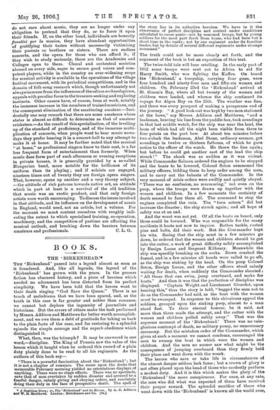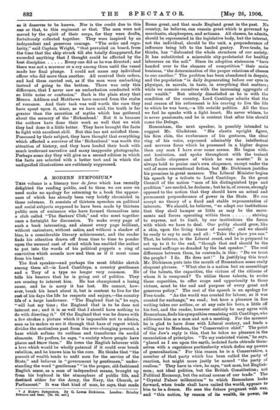BOOKS.
THE BIRKENHEAD.'* Tux Birkenhead' passed into a legend almost as soon as it foundered. And, like all legends, the legend of the 'Birkenhead' has grown with the years. In the process fiction has obscured history, and a piece of heroism which needed no adornment has been distorted from its perfect simplicity. We have been told that the heroes went to their death singing " God Save the Queen." There is no touch of melodrama that we have been spared, and, as the truth in this case is far greater and nobler than romance, we cannot but deplore the ingenuity of journalists and historians. But the errors of others make the task performed by Messrs. Addison and Matthews far better worth accomplish- ment, and we owe them a debt of gratitude for taking us back to the plain facts of the case, and for restoring to a splendid episode the simple courage and the superb obedience which distinguished it.
What, then, was the triumph P It may be answered in one word,—discipline. The King of Prussia saw the value of the lesson which it taught when he ordered this record of a plain duty plainly done to be read to all his regiments. As the
authors of this book say— "There is a powerful fascination about the Birkenhead '; but it is not a chapter of romance. The scene upon the decks that memorable February morning yielded no ostentatious displays of anything. There were no stage effects. There was no spectacle, save that of men overtaken by sudden disaster and aroused to a fearful danger, calmly giving and obeying orders, and resolutely doing their duty in the face of prospective death. The spell of *d Deathless Story; or, The ' Birkenhead' and its Heroes. By A. C. Addison and W. H. Matthews. London : Hutchinson and Co. [Gs.] the story lies in its collective heroism. Wo have in it the observance of perfect discipline and control under conditions calculated to cause panic—not by seasoned troops, but by young soldiers for the most part fresh from home, who had been but a short time in the ranks ; not by one regiment under its familiar
leader, but by details of several different regiments under strange command."
The truth could not be more clearly set forth, and the argument of the book is but an exposition of this text.
The twice-told tale will bear retelling. In the early part of 1852 some troops were sent out to Africa to aid Sir Harry Smith, who was fighting the Kaffirs. On board the Birkenhead,' a troopship, carrying four guns, were four hundred and ninety-four men and fifty-six women and children. On February 23rd the Birkenhead' arrived at St. Simon's Bay, where all but twenty of the women and children were landed, and whence the ship continued its voyage for Algoa Bay on the 25th. The weather was fine, and there was every prospect of making a prosperous end of the journey. " A good look-out was kept by two men stationed at the bows," say Messrs. Addison and Matthews, "and a leadsman, heaving his line from the paddle-box, took soundings in that last middle watch, for the ship was near the land, the loom of which had all the night been visible from three to four points on the port bow. At about ten minutes before two o'clock the leadsman, Abel Stone, ordinary seaman, got soundings in twelve or thirteen fathoms, of which he gave notice to the officer of the watch. He threw the line again ; but before he could get another cast of the lead the ship struck !" The shock was as sudden as it was violent. While Commander Salmon ordered the engines to be stopped and the boats to be lowered, Colonel Seton summoned the military officers, bidding them to keep order among the men, and to carry out the behests of the Commander. In the very moment of crisis orders were swiftly and quietly obeyed. " There was no confusion, no murmuring," not even on the poop, where the troops were drawn up together with the women and children. In a few moments the certainty of death seemed to face them all. The command to stop the engines completed the ruin. The "turn astern" did but increase the disaster; the ship struck again ; and all hope of safety was at an end.
And the worst was not yet. Of all the boats on board, only three could be lowered. Who was responsible for the many accidents it boots not now to inquire. Rotten tackle, rusted pins and bolts, did their work. But the Commander kept his wits. Seeing that the ship must in a few minutes go down, he ordered that the women and children should be got into the cutter, a work of great difficulty safely accomplished by Ensign Lucas and Sergeant Kilkeary. Meanwhile the ship was speedily breaking on the rocks. Down crashed the funnel, and in a few minutes all hands were called to go aft, as the ship was sinking by the head. On the poop Colonel Seton, Ensign Lucas, and the other officers stood calmly waiting for death, when suddenly the Commander shouted : "All those that can swim, jump overboard, and make for boats." And then it was that the perfection of discipline was displayed. " Captain Wright and Lieutenant Girardot, upon hearing this," thus the story is told, " begged the men not to do as the Commander had said, as the boat with the women must be swamped. In response to this chivalrous appeal the soldiers, grouped upon the sinking poop, almost to a man stood fast. To their eternal honour, be it said, not more than three made the attempt, and the cutter with the women and children pulled safely away." That was the supreme moment of the 'Birkenhead.' There was no vain- glorious contempt of death, no military pomp, no unnecessary ceremony. But the mistaken order of the Commander, which given at such a moment we cannot condemn, encouraged the men to swamp the boat in which were the women and children. And the men no sooner saw what might be the consequence of jumping overboard than they firmly held their place and went down with the wreck.
The heroes who save or take life in circumstances of the utmost danger seldom lack fame ; but a crown of glory is not often placed upon the head of those who modestly perform a modest duty. And it is this which makes the glory of the 'Birkenhead' the more conspicuous. For once, at any rate, the men who did what was expected of them have received their proper reward. The splendid sacrifice of those who went down with the 'Birkenhead' is known all the world over,
as it deserves to be known. Nor is the credit due to this one or that, to this regiment or that. The men were not moved by the spirit of their corps, for they were drafts, fortuitously collected together. They were inspired by an independent and generous courage. " The order and regu- larity," said Captain Wright, "that prevailed on board, from the time that the ship struck till she totally disappeared, far exceeded anything that I thought could be effected by the beat discipline Every one did as he was directed; and there was not a murmur or a cry among them until the vessel made her final plunge. I could not name any individual officer who did more than another. All received their orders, and had them carried out, as if the men were embarking instead of going to the bottom. There was only this difference, that I never saw an embarkation conducted with so little noise or confusion." Such is the plain story that Messrs. Addison and Matthews have rescued from the realm of romance. And their task was well worth the care they have spent upon it, since, as we have said, the truth is far greater than the accretion of myths which has gathered about the memory of the Birkenhead.' But it is because the authors have done their work so well that we wish they had done it a little better. They have brought the facts to light with excellent skill. But this has not satisfied them. Possessed by their subject, they have thought that everything which affected a survivor of the Birkenhead ' was worth the attention of history, and they have loaded their book with much irrelevant narrative and many inapposite photographs. Perhaps some day they will give us a second edition in which the facts are selected with a better tact and in which the undignified illustrations are ruthlessly suppressed.











































 Previous page
Previous page